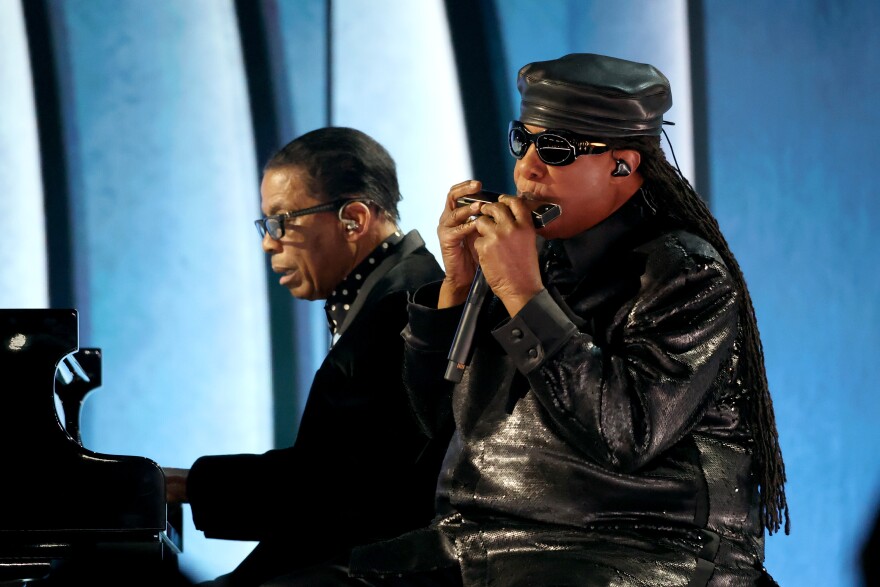Stevie Wonder, born on this day in 1950, is rightly heralded as a giant of soul, R&B and popular music, one of the most impactful artists of the 20th century.

He was deeply influenced by jazz, and has influenced jazz in turn: consider the moment at this year’s Grammy awards when he shared a piano bench with Herbie Hancock, playing Benny Golson’s “Killer Joe” in a memorial tribute to Quincy Jones. Consider, too, the profusion of jazz artists who have approached his songs as standards — a tradition that we’ll celebrate with a special edition of Late Evening Jazz.
“In honor of Stevie Wonder’s 75th, I’m overjoyed to pay homage to his vast tapestry of music,” says host Courtney Blue. From 9 p.m. to midnight, she’ll play nothing but jazz versions of Stevie Wonder’s music, from the familiar to the obscure.
“Though I grew up hearing most of his radio hits, I wasn’t too familiar with his deeper catalogue initially,” Blue says. “It’s been through my work at WRTI and exploration of jazz that the whole scope of Stevie’s music has been unveiled for me. For years, jazz artists have interpreted and reworked the magic that is his music. I’m excited to share even a microcosmic glimpse of that on this three-hour special.”
Here’s a spotlight on seven of the tracks that you’ll hear in tonight’s broadcast. For the full experience, tune in to Late Evening Jazz on WRTI.
Ramsey Lewis, “Living for the City”
Stevie Wonder’s pocket epic “Living for the City” was released in 1973, as a single and as a track on the album Innervisions. Within a year, keyboardist Ramsey Lewis had made this cover version, including it on Side A of his jazz-funk album Sun Goddess. Lewis’ Wurlitzer and ARP Synthesizer are a pitch-perfect tribute to Wonder — as is the funky rhythm section, propelled by Chicago drummer Morris Jennings.
Rahsaan Roland Kirk, “Ma Cherie Amour”
Rahsaan Roland Kirk’s classic Atlantic album Volunteered Slavery combines material recorded at the 1968 Newport Jazz Festival with studio tracks made the following year. Among the latter is a spirited take on a brand-new Stevie Wonder single, “My Cherie Amour” — retitled and lightly reformulated, with Kirk on flute and vocalizations over a sunny backbeat.
Abbey Lincoln, “Love Having You Around”
“Love Having You Around,” from Stevie’s pivotal 1972 album Music of My Mind, provides a title track for a posthumous live album by Abbey Lincoln. Recorded at Keystone Korner in San Francisco in 1980, it finds her in fine, assertive form — and in good company, leading a band that includes Phil Wright on piano, James Leary on bass and Doug Sides on drums.
Anthony Wonsey, “Overjoyed”
Pianist Anthony Wonsey released his album The Thang on the Sharp Nine label in 2005, working with a rhythm team of drummer Joe Farnsworth and bassist Nat Reeves. Their version of “Overjoyed” has a delightful sense of drift; at various moments it may remind you of a Robert Glasper soul reverie or the Ahmad Jamal Trio finessing “Poinciana,” but always with Wonsey in the driver’s seat.
Alicia Olatuja, “Stay Gold (feat. Gregoire Maret)”
Here’s a deeper cut, originally featured on the motion picture soundtrack for The Outsiders. Alicia Olatuja takes full advantage of its relative obscurity, savoring the melody’s unmistakably Wonder-esque line at a regal, unhurried pace. The harmonica obbligato and solo are courtesy of Grégoire Maret, who knows how to evoke Stevie’s style without surrendering his own.
Julius Rodriguez, “All I Do”
On Hotter Than July, “All I Do” tumbles straight out of the opening cut, “Did I Hear You Say You Love Me,” without so much as a pause for breath. This fond tribute, from the 2022 debut album by pianist Julius Rodriguez, eases up on the throttle a bit — recalling the song’s sauntering first recorded version, by Tammi Terell. Mariah Cameron, a childhood friend of Rodriguez, sings lead vocals, with Vuyo Sotashe singing backup.
Orrin Evans, “They Won’t Go When I Go (feat. Alita Moses)”
There’s a somber grandeur to “They Won’t Go When I Go,” which appears on the 1974 album Fulfillingness’ First Finale; many have noted its allusion to the 19th-century German chorale hymn “O mein Jesu, Ich Muss Sterben.” On this version, from Orrin Evans’ 2023 album The Red Door, he and guest vocalist Alita Moses access that churchly lineage with a satisfying gospel lilt.


